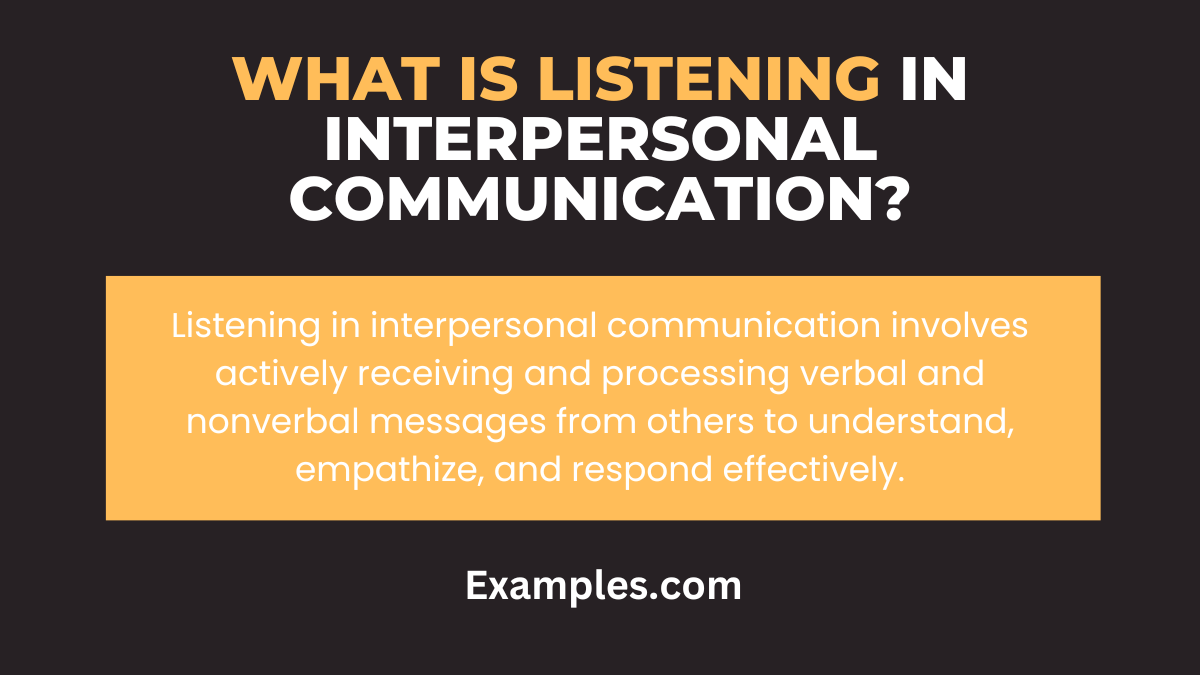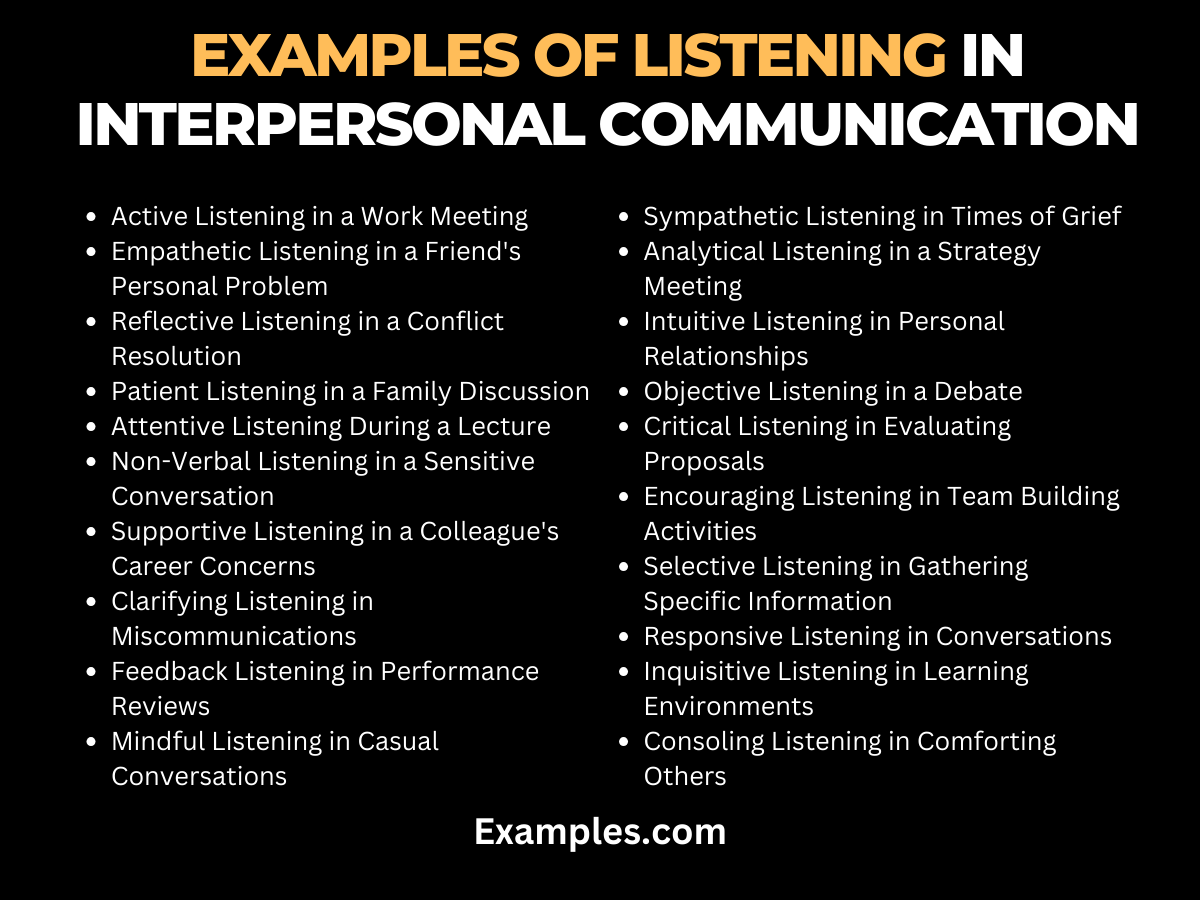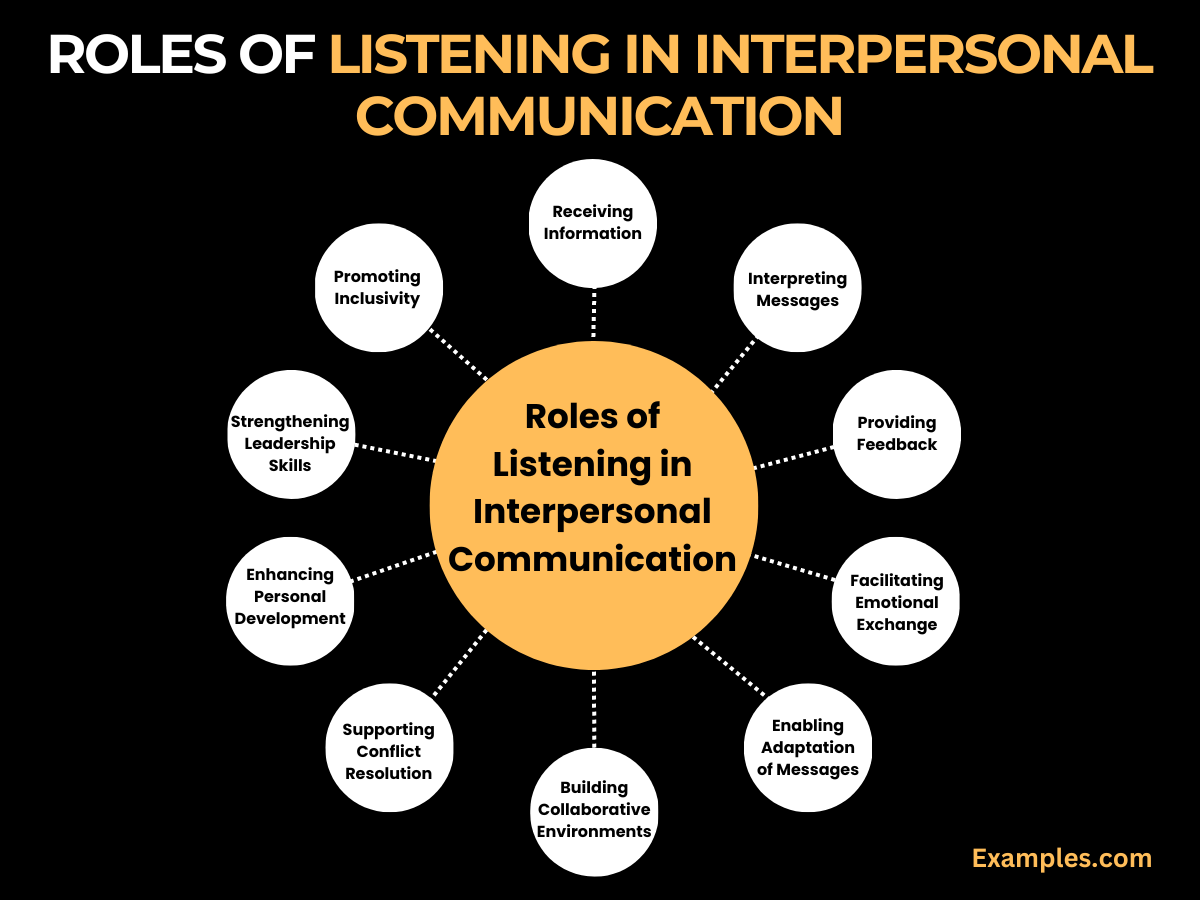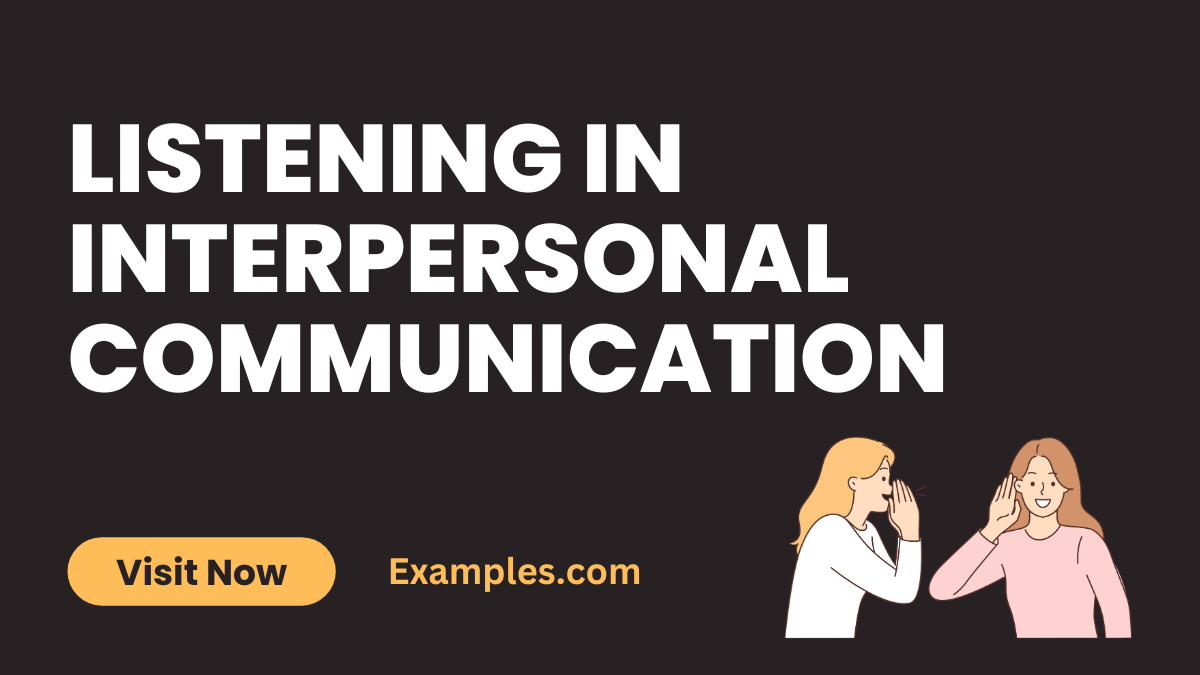19+ Listening in Interpersonal Communication Examples
Listening in Interpersonal Communication is an indispensable skill that goes beyond just hearing words. It involves interpreting and understanding the underlying emotions, intentions, and subtle nuances in a conversation. This comprehensive guide delves into the essence of effective listening within the realm of interpersonal communication. You’ll explore various Interpersonal Communication Examples that demonstrate how listening can transform personal and professional interactions. From recognizing non-verbal cues to responding empathetically, this guide equips you with the skills to listen not just with your ears, but with your heart and mind. Effective listening in interpersonal scenarios is more than a passive activity; it’s an active engagement that fosters deeper connections, trust, and mutual respect.
What is Listening in Interpersonal Communication?

Listening in Interpersonal Communication is a dynamic process that involves attentively receiving, interpreting, and responding to verbal and non-verbal messages in personal interactions. It’s not merely a passive act of hearing words but an active effort to understand the complete message being conveyed. This process includes paying attention to the speaker’s words, tone, and body language, and providing appropriate feedback. Effective listening in interpersonal contexts allows for a deeper understanding of others, fostering empathy, trust, and stronger connections. It’s a crucial skill in Verbal Communication and Non-Verbal Communication that enhances personal and professional relationships by ensuring clear, respectful, and empathetic exchanges.
20 Examples of Listening in Interpersonal Communication

Listening is a pivotal aspect of interpersonal communication. It involves not just hearing the words spoken, but also understanding the emotions, intentions, and thoughts behind them. Effective listening in interpersonal communication enhances understanding, builds stronger relationships, and resolves conflicts more efficiently. Here are 20 examples, each with a brief description and example sentences, demonstrating how listening can be effectively practiced in various interpersonal scenarios.
- Active Listening in a Work Meeting
Actively listen by focusing entirely on the speaker, nodding, and giving verbal affirmations.
“I see your point about the project deadline. How do you suggest we address the resource issue?” - Empathetic Listening in a Friend’s Personal Problem
Show empathy by acknowledging their feelings and offering support.
“It sounds like you’re really stressed about this situation. What can I do to help?” - Reflective Listening in a Conflict Resolution
Reflect back what you’ve heard to show understanding.
“So, what you’re saying is you felt overlooked when I didn’t consult you on that decision?” - Patient Listening in a Family Discussion
Listen without interrupting, even when the conversation is emotionally charged.
“I want to understand your perspective fully. Please tell me more about why you feel this way.” - Attentive Listening During a Lecture
Focus intently on the speaker, taking notes and avoiding distractions.
“Your point about climate change’s impact was intriguing. Can you elaborate more on that?” - Non-Verbal Listening in a Sensitive Conversation
Use body language, like nodding and maintaining eye contact, to show you’re engaged.
“Your body language suggests this topic is important to you. Let’s discuss it more.” - Supportive Listening in a Colleague’s Career Concerns
Offer verbal support and encouragement in response to their concerns.
“I understand why that feedback was disheartening. Remember your strengths in managing clients.” - Clarifying Listening in Miscommunications
Ask clarifying questions to ensure full understanding.
“Could you clarify what you meant by ‘immediate action’? Do you have a specific timeline in mind?” - Feedback Listening in Performance Reviews
Listen to feedback without defensiveness, understanding the intent to improve performance.
“I appreciate your feedback on my presentation skills. How can I make them more effective?” - Mindful Listening in Casual Conversations
Stay present and avoid getting distracted by external factors.
“I’m fully focused on our conversation. Tell me more about your trip.” - Sympathetic Listening in Times of Grief
Express sympathy and understanding for the speaker’s emotions.
“I can’t imagine how difficult this is for you. I’m here to listen whenever you need.” - Analytical Listening in a Strategy Meeting
Analyze the information being presented for decision-making.
“Based on what you’ve shared, it seems we should reconsider our marketing strategy.” - Intuitive Listening in Personal Relationships
Read between the lines and understand the unspoken messages.
“You say you’re fine, but I sense there’s something more. Want to talk about it?” - Objective Listening in a Debate
Remain neutral and focus on the facts presented, rather than being swayed by emotions.
“Your points are valid, but let’s look at the data before drawing conclusions.” - Critical Listening in Evaluating Proposals
Evaluate the validity and logic of the information presented.
“Your proposal is interesting, but how does it align with our current objectives?” - Encouraging Listening in Team Building Activities
Motivate and uplift the speaker through positive reinforcement.
“Your enthusiasm for this project is inspiring. Keep up the great work!” - Selective Listening in Gathering Specific Information
Focus on key details pertinent to the situation at hand.
“Regarding your report, I’m particularly interested in the customer feedback section.” - Responsive Listening in Conversations
Respond appropriately, showing that you are engaged and understand the message.
“I agree with your point about needing more team resources. Let’s discuss potential solutions.” - Inquisitive Listening in Learning Environments
Show curiosity by asking relevant questions.
“Your research on renewable energy is fascinating. How do you think it will impact future policies?” - Consoling Listening in Comforting Others
Offer comfort and a listening ear during tough times.
“I’m here for you. If you want to talk about it, I’m ready to listen.”
Why Listening is Important in Interpersonal Communication?
Listening plays a pivotal role in interpersonal communication, impacting the effectiveness of exchanges in both personal and professional settings. This importance stems from several key factors:
- Building Understanding: Active listening helps in understanding the speaker’s message accurately. It involves not just hearing the words, but also comprehending the intent and emotion behind them.
- Enhancing Relationships: Effective listening fosters stronger relationships. It shows respect and interest in what others have to say, leading to deeper connections and trust.
- Reducing Misunderstandings: By carefully listening, individuals can clarify ambiguities and avoid misunderstandings that could lead to conflicts.
- Improving Problem-solving Skills: Listening to different perspectives enhances problem-solving and decision-making abilities. It opens up new viewpoints and solutions that may not be apparent from a single standpoint.
- Promoting Empathy: Listening attentively helps in understanding the feelings and emotions of others, fostering empathy and compassion in interpersonal interactions.
- Facilitating Effective Feedback: In Interpersonal Communication, feedback is crucial. Listening aids in providing relevant and constructive feedback, as it allows for a better understanding of the context and content of the communication.
- Enhancing Learning: Good listening skills in a learning environment allow for better absorption and retention of information, which is essential in educational and training contexts.
- Building Rapport: Listening creates a sense of mutual respect and understanding, which is essential for building rapport in both personal and professional relationships.
- Encouraging Open Communication: When individuals feel heard, they are more likely to share openly and honestly, leading to more transparent and effective communication.
- Cultural Sensitivity: In a world of diverse cultures, listening attentively helps in understanding different cultural nuances and responding appropriately in various interpersonal situations.
What are the Roles of Listening in Interpersonal Communication

Listening is a fundamental component of interpersonal communication, playing several critical roles:
- Receiving Information: It’s the primary means through which we receive information from others, forming the basis of our responses and interactions.
- Interpreting Messages: Listening involves interpreting both verbal and non-verbal communication cues. This interpretation is crucial for understanding the complete message being conveyed.
- Providing Feedback: Effective listening allows for providing appropriate feedback, which is essential in confirming understanding or clearing up confusions.
- Facilitating Emotional Exchange: Listening is key in emotional exchanges, allowing individuals to express and understand emotions effectively.
- Enabling Adaptation of Messages: It helps in adapting one’s own communication style and content based on the listener’s feedback and responses.
- Building Collaborative Environments: In group settings, listening facilitates collaboration and cooperation by ensuring all voices are heard and considered.
- Supporting Conflict Resolution: In conflict situations, active listening can help de-escalate tensions and find common ground.
- Enhancing Personal Development: Listening contributes to personal growth by exposing individuals to diverse perspectives and ideas.
- Strengthening Leadership Skills: Effective leaders use listening to understand the needs and concerns of their team members, fostering a supportive and productive environment.
- Promoting Inclusivity: Good listening practices ensure inclusivity, making sure that all individuals, regardless of their communication style, feel heard and valued.
In conclusion, the art of listening in interpersonal communication is a multifaceted skill that extends far beyond mere auditory perception. It involves active engagement, where one not only hears but also interprets, responds, and empathizes with the speaker. This active participation is crucial for effective interpersonal interactions, as it fosters a deeper understanding and connection between individuals. For those looking to delve deeper into the nuances of listening and its impact on interpersonal relationships, the Encyclopedia of Communication and Information offers an in-depth exploration of active listening and its role in effective communication Explore more on Encyclopedia.com. Additionally, the Social Sci LibreTexts provides a comprehensive guide on the fundamentals of listening, shedding light on its importance and various dimensions in interpersonal communication Learn more at Social Sci LibreTexts. Both these resources are instrumental in understanding the complexity and significance of listening in our daily interactions.



